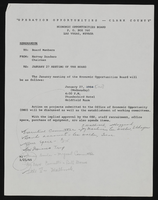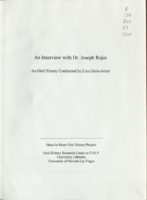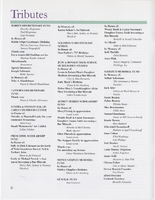Search the Special Collections and Archives Portal
Search Results

Transcript of interview with Mahamed Youssouf by Barbara Tabach, August 6, 2013 & August 13, 2013
Date
Archival Collection
Description
Ethiopian business owner Mahamed Youssouf became an American citizen in 1986. Born in Harar, Ethiopia, he recalls the hardships he had to endure during the Ethiopia-Somalia conflict. Coming from a family of tailors, he began making clothes with his father at a very early age. Mahamed’s recollections concerning his journey from political refugee to successful businessman demonstrates his resilience and determination to overcome obstacles and achieve his goals. Mahamed moved to Las Vegas, Nevada in 1985, where he rented a storefront in North Las Vegas. The name of his store was Uniform Plus and he focused mainly on making children’s clothes. His efforts proved lucrative as he began buying wholesale in Los Angeles, California, and selling clothes in Las Vegas on the weekends at the outdoor Swap Meet. After a fateful encounter, Mahamed became business partners with Eugene Hoffman, owner of Village East Cleaners. Mahamed firmly believes that communication is the key to socio-economic success. He views education as an investment and states that, “to have dialogue means better relationships.” When the Ethiopian government was overthrown, Mahamed returned home to Africa for a visit. He met his wife while there, got married, and started a family. Mahamed returned to America and bought a family home in Las Vegas. He dedicated his time to teaching his American born children more about Ethiopian culture and taught himself more about American culture— including the African-American experience in Las Vegas, racism, the Moulin Rouge, and the Westside.
Text

Transcript of interview with Elinor Horden by Valerie Fujii, February 13, 1930
Date
Archival Collection
Description
On February 13th, 1980, collector Valerie Fujii interviewed dancer, Elinor Horden, (born May 21st, 1930 in Ohio) at the University of Nevada, Las Vegas. This interview covers local entertainment in the 1950s and the social and environmental changes that have occurred in Las Vegas, Nevada.
Text

Transcript of interview with Gertrude Rudiak by Claytee White, January 11, 2007
Date
Archival Collection
Description
Gertrude (n?e Rightman) Rudiak was born in 1915 in North Dakota to Russian immigrants. She grew up in Wisconsin until 1924. That was the year the family drove to California via the Yellowstone Trail, a dusty, undeveloped road marked by yellow stones. In Los Angeles, her father practiced chiropractic, a holistic approach to well-being for which there was little knowledge at the time. Gertrude earned her music degree at University of California at Berkeley; a decision that did not lead to a career. She then attended a business college and got a job as a social worker in Northern California. In 1941, she met and soon married George Rudiak. It was the advent of World War II. George enlisted in the service and was assigned to Las Vegas Gunnery School (Nellis Air Force Base.) Since he had a law degree from University of California at Berkeley and passed the Nevada Bar exam, he found supplemental employment with local attorneys. Las Vegas became the Rudiaks? permanent home where they raised their five children. In this interview Gertrude recalls the stories of coming to live in Las Vegas of the 1940?s: their phone number was 1-2-3; the neighborhood they lived in longest being Scotch 80s and being part of the secular and Jewish communities.
Text

Transcript of interview with Mike and Susan Baller by Barbara Tabach, March 16, 2016
Date
Archival Collection
Description
In this interview, Mike and Susan Baller reflect upon their lives in Las Vegas, from growing up as teenagers amongst the tight-knit Jewish community, to mob influence on the city, and the impact of the city's growth. Mike shares stories about first arriving in Las Vegas to live, being a teenaged busboy at Binions Horseshoe to being related to Moe Dalitz -- in Michigan Mike drove a truck for the Dalitz dry cleaning business.
Text

Lisa Hank oral history interview: transcript
Date
Archival Collection
Description
Oral history interview with Lisa Hank conducted by Barbara Tabach on May 31, 2019 for the Remembering 1 October Oral History Project.
Lisa discusses her move to Las Vegas in the early 1990s from California for a job with the Las Vegas Metropolitan Police Department, and her current position as head of the Police Employee Assistance Program (PEAP). Lisa talks about the night of October 1 and the aftermath of the shooting, both in her work and personal life. She is the wife of Charles Hank III, police officer and another interviewee for the Remembering 1 October Oral History Project.
Subjects discussed include: well-being in aftermath of 1 October; PEAP preparation; healing.
Text

Economic Opportunity Board of Clark County (Nev.): memos, agendas, and meeting minutes
Date
Archival Collection
Description
From the Clark County Economic Opportunity Board Records -- Series I. Administrative. This folder contains memos, agendas and minutes from meetings of the Clark County Economic Opportunity Board in 1965 talking about applications, programs, budgets, and more.
Text

Transcript of interview with Dr. Joseph Rojas by Lisa Gioia-Acres, September 30, 2008
Date
Archival Collection
Description
Dr. Joseph Rojas, born 1933 in Alexandria, Louisiana, was the son of Joseph Edward Rojas and wife Carroll. He graduated high school at age 16 and entered Loyola University of the South. Two years later he was accepted at Louisiana State University School of Medicine, graduating with a medical degree in 1957. He interned at Charity Hospital and then completed his OB-GYN residency at Tulane University. Several mentors worked with Dr. Rojas during his residency and he recalls learning surgical and bed-side skills from the likes of Dr. Lynn White and Dr. Fred Janson. He also remembers the very high volume of patients - up to 300 - that he and other residents saw daily. Dr. Rojas married Mona Robicheaux, RN, during his residency and afterwards joined the Air Force. He and his family — they eventually had six children — were stationed at Nellis Air Force Base, arriving in Las Vegas in 1961. He was chief of OBGYN and deputy hospital commander while at Nellis and then served as chief of OBGYN at Southern Nevada Memorial Hospital until 1972. He later served as chief of staff at Women's Hospital and Valley Hospital, and was the first chief of staff at Summerlin Hospital. Dr. Rojas also maintained a private practice outside of the hospital. His wife worked alongside him in his office, and they share memories and anecdotes of the patients they saw and the general atmosphere of the medical community. Both Joseph and Mona agree that Las Vegas hospitals were less racially segregated than the hospitals in Louisiana, and felt that the West was more open to integration. In 1966 Dr. Rojas started the first OB-GYN residency in Nevada, which led to the development of the University of Nevada School of Medicine. He was a researcher, lecturer, teacher, and author. He earned many awards, including the Harold Feikes MD Award for Outstanding Physician in Clark County (2001), and the Nevada State Medical Association Distinguished Physician Award (1980). Dr. Rojas passed away in May of 2009, leaving behind an incredible legacy of service to the residents of Clark County.
Text

Miguel Villarba oral history interview: transcript
Date
Archival Collection
Description
Oral history interview with Miguel Villarba conducted by David Islas on December 6, 2021 for Reflections: The Las Vegas Asian American and Pacific Islander Oral History Project. In this interview, Miguel Villarba shares his family's history growing up in Manila, Philippines and immigrating to the United States in 2016. He talks about first living in Chattanooga, Tennessee before moving to Las Vegas, Nevada to be near family when Miguel was in high school. Miguel Villarba shares stories of his grandfather's farm in Pangasinan, Philippines, the differences in city and town life across Manila, Chattanooga, and Las Vegas, and his educational plans. He also talks about Filipino culture and traditions, and racial discrimination.
Text
Stacy Smith and Sofia Allison (Nye Communities Coalition) oral history interview conducted by Kelliann Beavers and Elia Del Carmen Solano-Patricio: transcript
Date
Archival Collection
Description
From the Lincy Institute "Perspectives from the COVID-19 Pandemic" Oral History Project (MS-01178) -- Community organization interviews file.
Text

